Phrasal verbs with Bear (on, upon, in, out, up, with) Vocabulary Point

Conjugation Bear 🔸 Verb in all tenses and forms Conjugate in past, present and future
Conjugate the English verb bear: indicative, past tense, participle, present perfect, gerund, conjugation models and irregular verbs. Translate bear in context, with examples of use and definition.

Bear past participle Archives EngDic
The verb "bear" is an irregular verb. (This means that "bear" does not form its simple past tense or its past participle by adding "-ed" or "-d" to the base form.) The Five Forms of "To Bear" Form bear Alternative Name; Base Form: bear: Infinitive Form: The -S Form: bears: Third Person Singular Form: Past Form: bore:
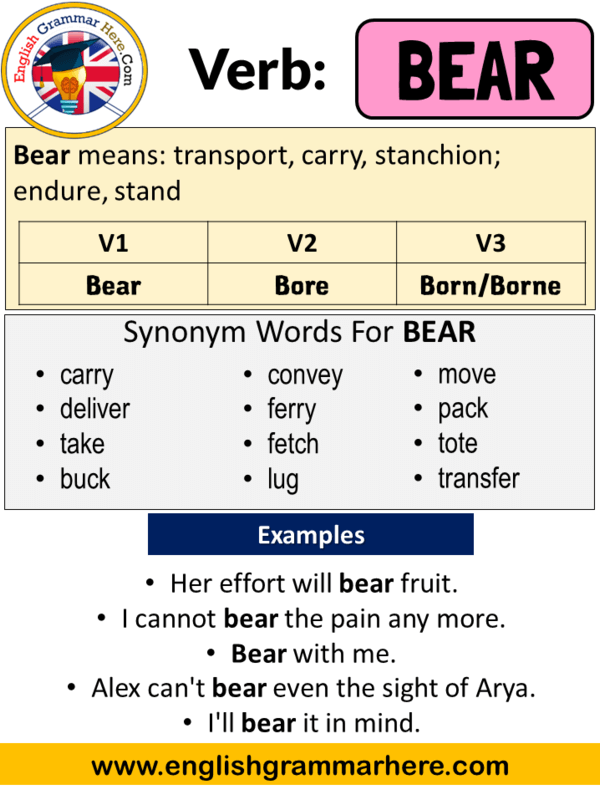
Bear Past Simple, Simple Past Tense of Bear Past Participle, V1 V2 V3 Form Of Bear English
The English verb 'bear' is pronounced as [ber]. Related to: irregular verbs. 3 forms of verb bear: Infinitive (bear), Past Simple - (bore), Past Participle - (borne).. Here are the past tense forms of the verb bear. 👉 Forms of verb bear in future and past simple and past participle. What is the past tense of bear.
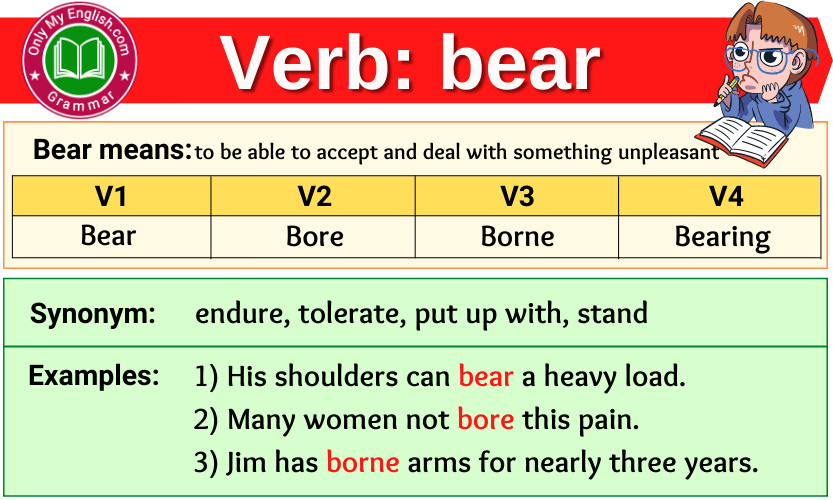
Bear Verb Forms Past Tense, Past Participle & V1V2V3 »
BEAR meaning: 1. to accept, tolerate, or endure something, especially something unpleasant: 2. to be responsible…. Learn more.
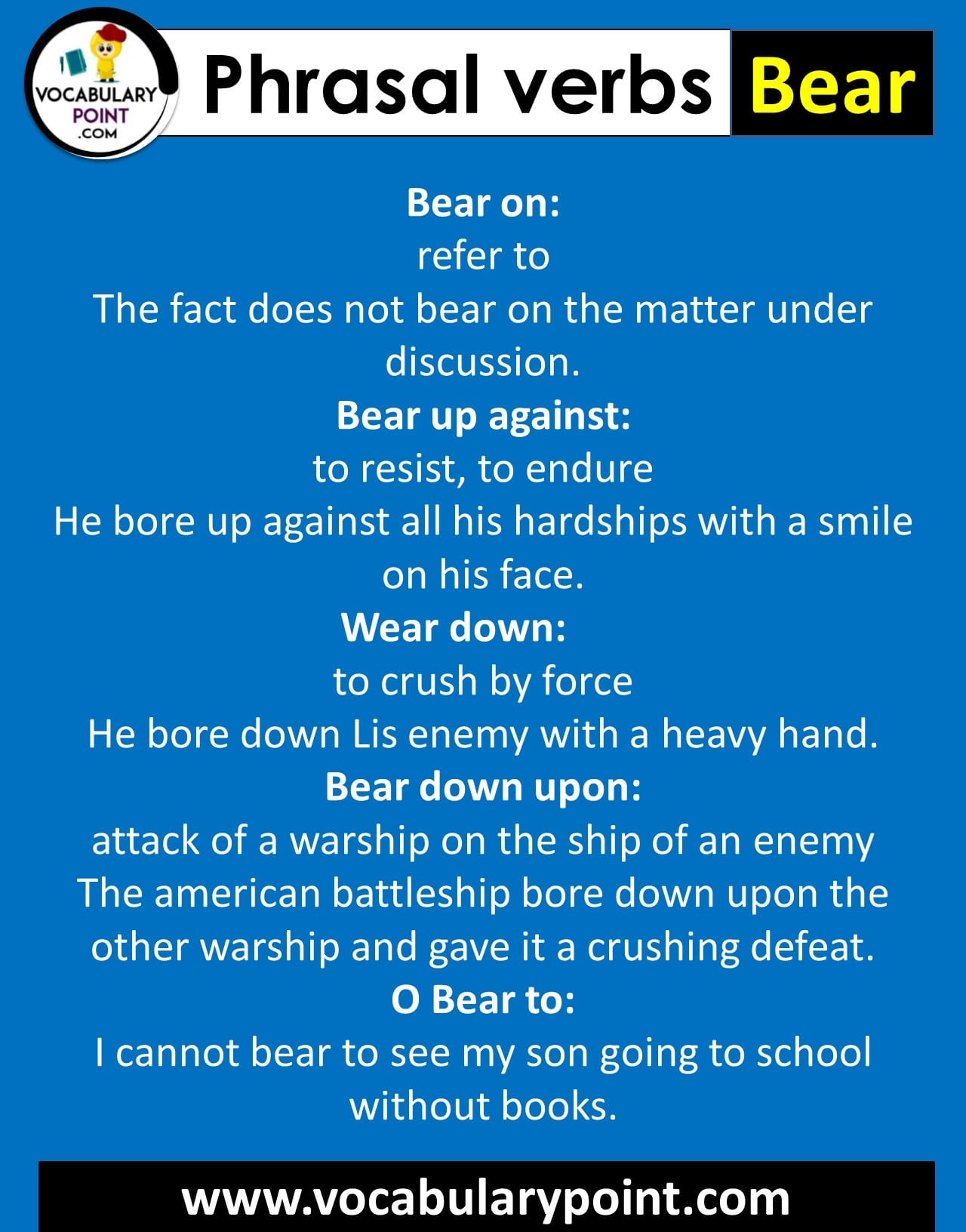
Phrasal verbs with Bear (on, upon, in, out, up, with) Vocabulary Point
verbs ending in -e: like. wear - model verb ⓘ Change -ea- to -o- and add a final -e to form the preterit. To form the past participle, replace the final -e of the preterit with -n. Verbs that follow this model: bear; forbear foreswear forswear
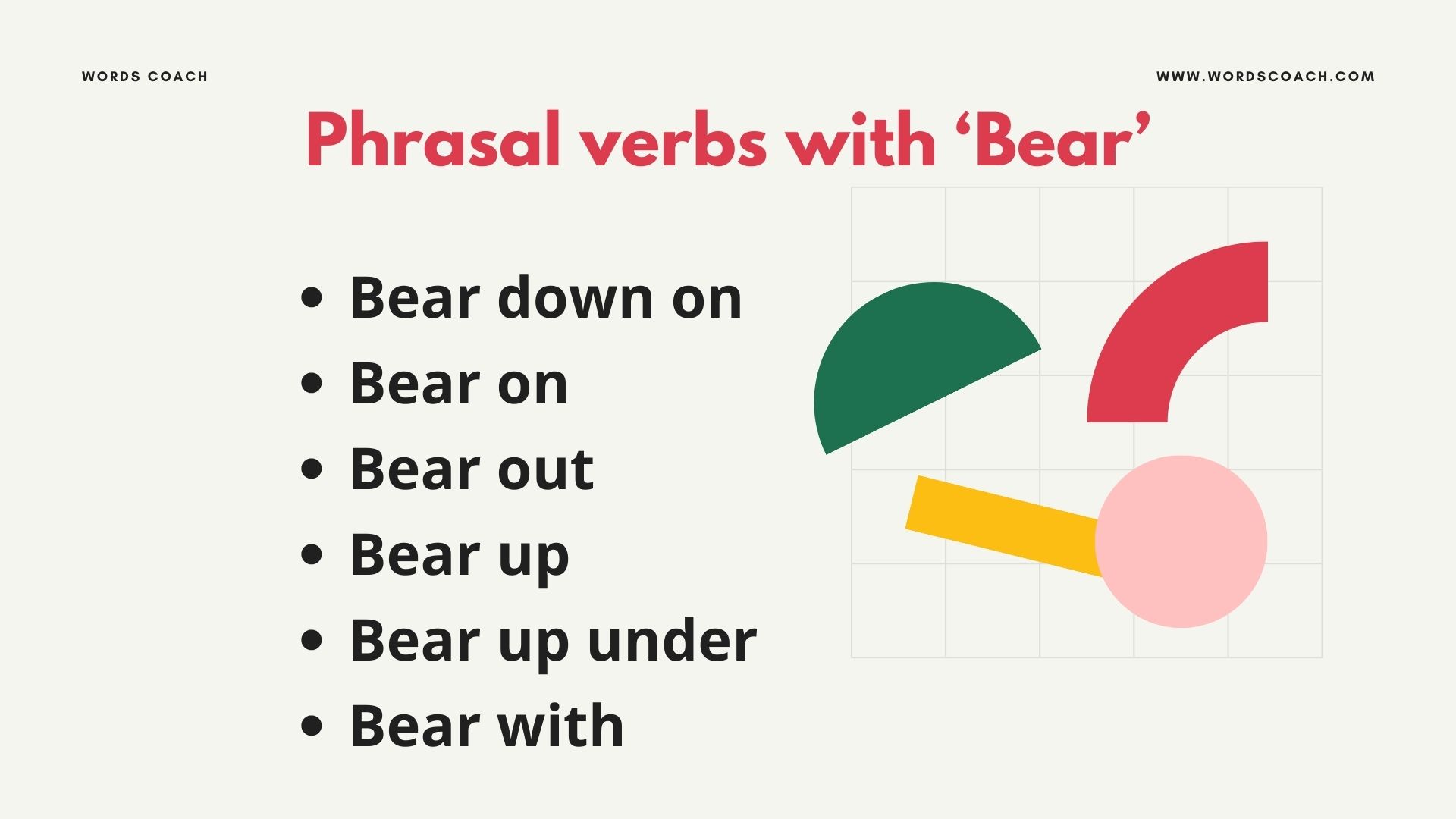
Phrasal verbs with Bear Word Coach
accept/deal with; 1 [transitive] (used with can/could in negative sentences and questions) to be able to accept and deal with something unpleasant synonym stand bear something The pain was almost more than he could bear. She couldn't bear the thought of losing him. bear doing something I can't bear having cats in the house. He can't bear being laughed at. bear to do something He can't bear to.

Verb forms of bear V1,V2,V3,V4,V5 BEAR shorts verbforms Arvindclassesenglish
Bear definition: to hold up; support. See examples of BEAR used in a sentence.

Perbedaan kata "Bear (Noun)" & "Bear (Verb)" beserta ContohContoh Kalimatnya Nouns, Bear verb
2. He was born in New York.. The irregular verbs in the table below have the same pattern as bear. They are: - Verbs with '-ear', '-ore', '-orn' in the three forms. - Verbs like 'tear, tore, torn'. Verb Simple past Past Participle; bear: bore: born/borne: shear: sheared/shore: sheared/shorn: swear: swore: sworn:

Phrasal verb ( bear away, bear on/upon, bear out, bear with) YouTube
25 meanings: 1. to support or hold up; sustain 2. to bring or convey 3. to take, accept, or assume the responsibility of 4. to.. Click for more definitions.

Irregular verb Bear / bore / born (forms, meaning, example, picture, pronunciation) YouTube
Bear Verb 1 2 3, Past and Past Participle Form Tense of Bear V1 V2 V3. bear. Meanings; Carry the weight of; support.(transitive verb) Endure (an ordeal or difficulty)(transitive verb) (of a person) carry (someone or something)(transitive verb) Verb(V1) Past Tense(V2) Past Participle(V3) bear: bore: born: Verb - es(Ves)

GRAMMAR Active or Passive (to bear) ENGLISH Your Way!
Bore is the past tense of the word bear. Borne is the past participle of the word bear. bear past form, verb forms, v1v2v3, Infinitive
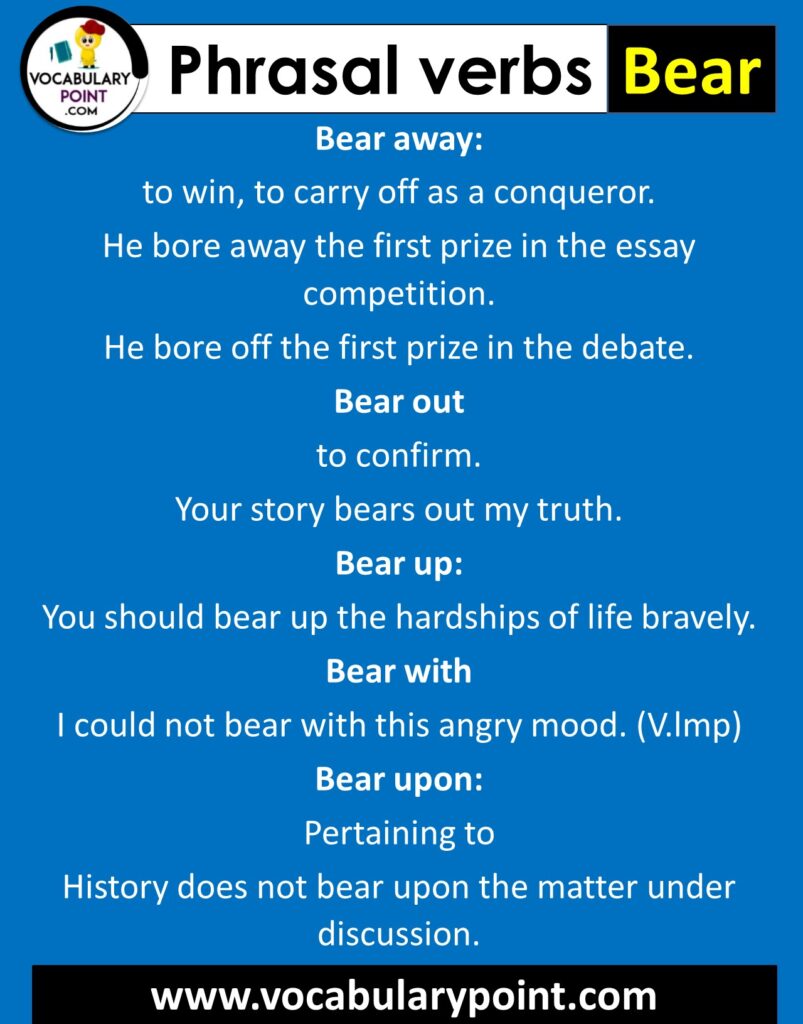
Phrasal verbs with Bear (on, upon, in, out, up, with) Vocabulary Point
bear in American Englishesp collectively. (bɛər) (noun plural bears, bear, verb beared, bearing) noun. 1. any of the plantigrade, carnivorous or omnivorous mammals of the family Ursidae, having massive bodies, coarse heavy fur, relatively short limbs, and almost rudimentary tails. 2.
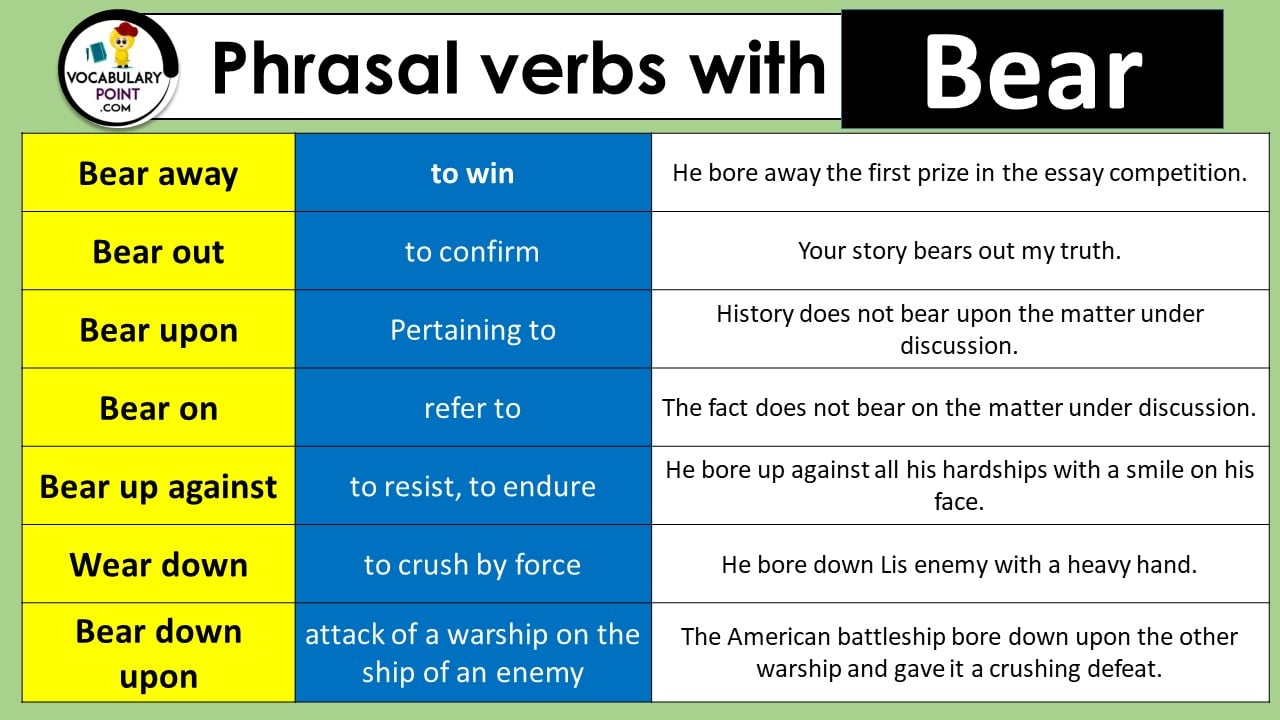
Phrasal verbs with Bear (on, upon, in, out, up, with) Vocabulary Point
BEAR meaning: 1. to accept someone or something unpleasant: 2. to be similar to someone or something: 3. to…. Learn more.
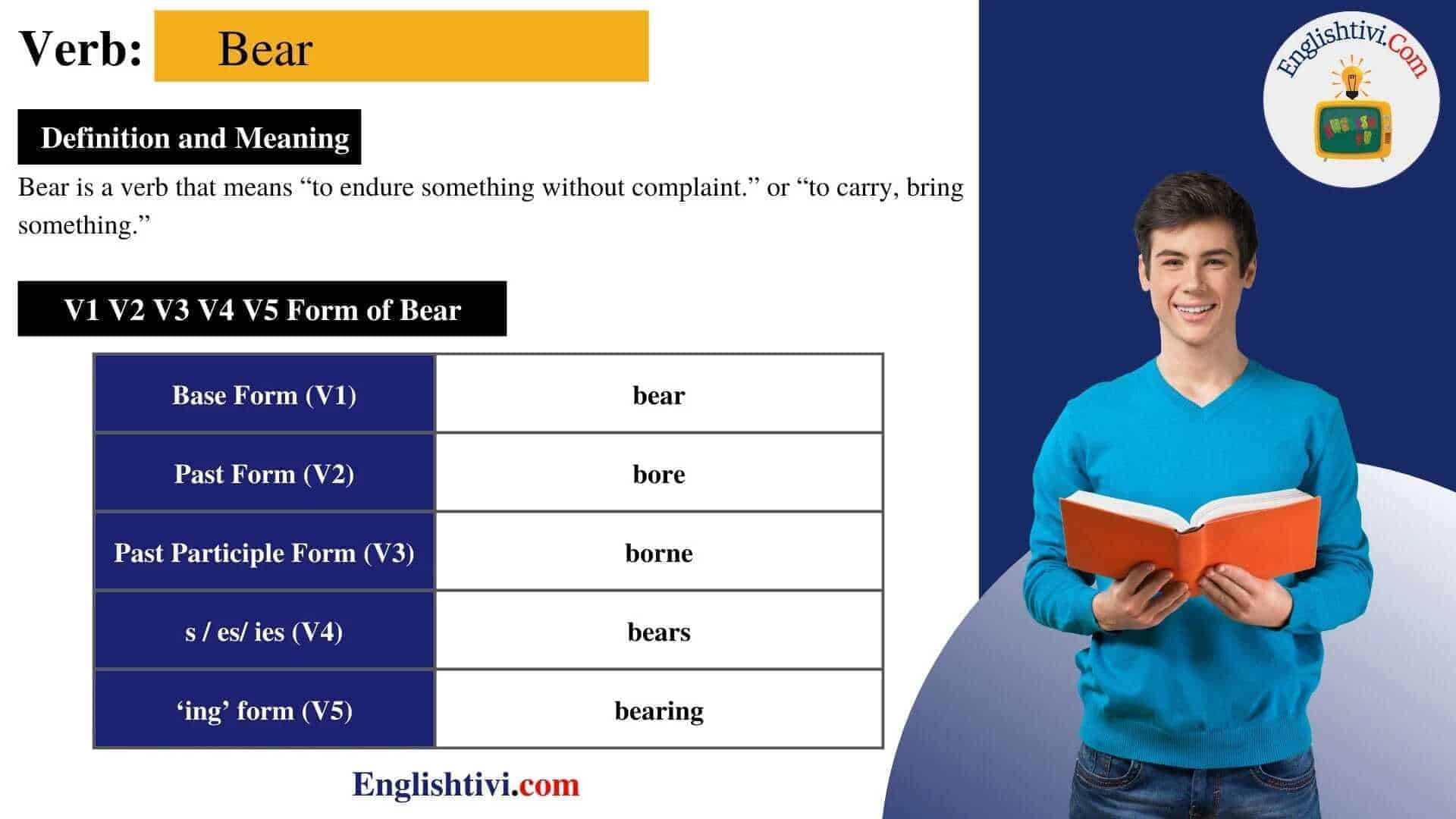
Bear V1 V2 V3 V4 V5 Base Form, Past Simple, Past Participle Form of Bear Englishtivi
The earliest known use of the verb bear is in the 1830s. OED's earliest evidence for bear is from 1837, in the writing of W. Maginn. It is also recorded as a noun from the Old English period (pre-1150). bear is formed within English, by conversion. Etymons: bear n.1.

Past Tense Of Bear, Past Participle Form of Bear, Bear Bore Borne V1 V2 V3 … English
bear: [noun] any of a family (Ursidae of the order Carnivora) of large heavy mammals of America and Eurasia that have long shaggy hair, rudimentary tails, and plantigrade feet and feed largely on fruit, plant matter, and insects as well as on flesh.
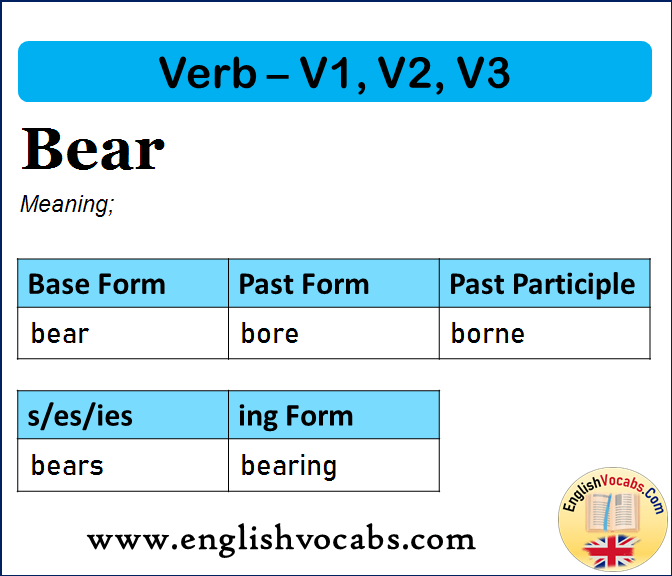
Bear Past Simple Archives English Vocabs
BEAR definition: 1. to accept, tolerate, or endure something, especially something unpleasant: 2. to be responsible…. Learn more.